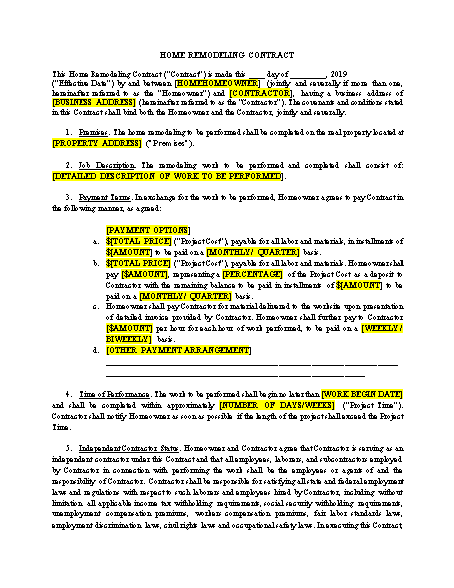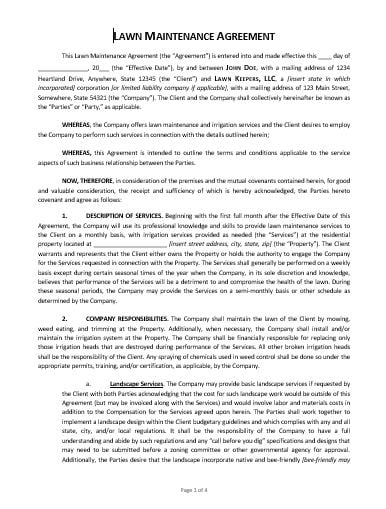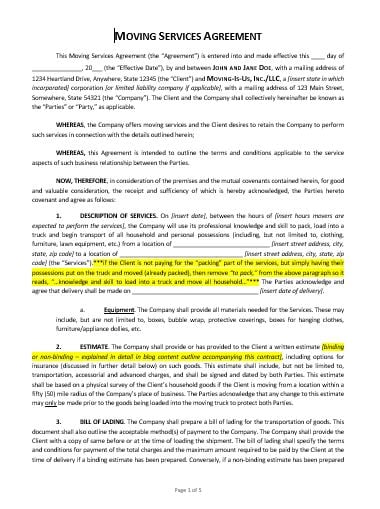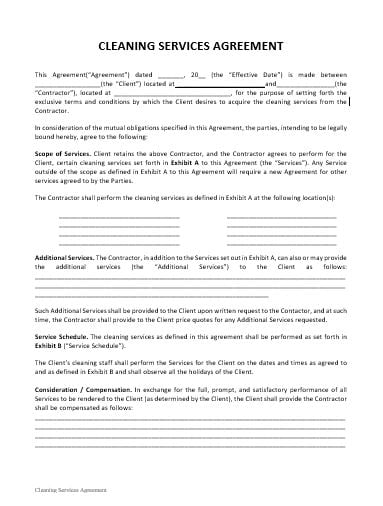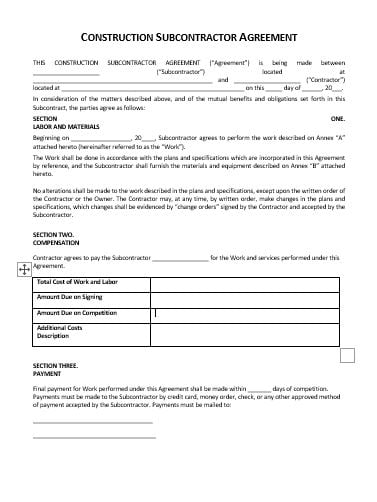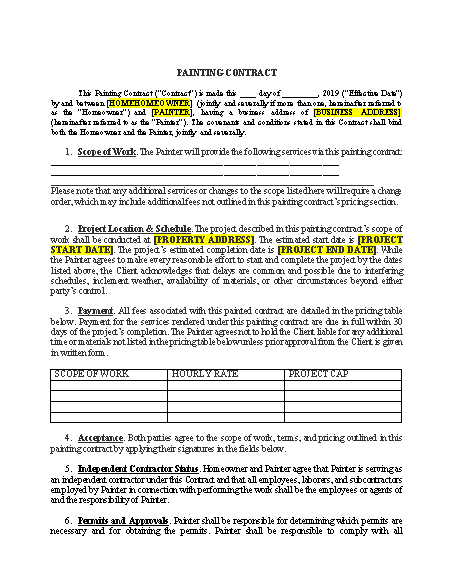Home Remodeling Contract Agreement Template Key Points
You want to make some changes to your home. Maybe you want to install new countertops, update your roofing, add a patio, build or deck or some other form of remodeling project. Either the scope of the work you need completed is enough to warrant using a home improvement contractor. The contractor is an independent person that you’ve heard great things about but they don’t even have a form of written contract or something to put into writing what work is going to be performed or how payment will be made. In order to protect yourself, you are sharp enough to know- you must get an agreement between you and this contractor for the remodeling services provided. Your home is probably your largest and most important asset. It is the one thing you should protect above all else. You carry insurance to protect, have smoke detectors, carbon monoxide detectors but yet allowing someone to perform repair work on your home could not only cause damage but it could turn into a nightmare having liens filed against your asset because of a slight disagreement or lack of communication with the Contractor. A contract between you and an independent contractor should protect you, your real estate and the contractor, and address any potential issue that might arise. Here are some key things you will want to address: A description of the project. The contract should include a project description that thoroughly outlines all of the work, materials, and products that will go into the job. That includes everything from what will be demolished to what will be constructed—and each different material and fixture that will be used, with its associated cost. It should also specify that the contractor will obtain all of the necessary permits (and close them out by getting the required certificates of occupancy) and dispose of the debris properly, and that the project is covered by his liability and workman’s compensation insurance. Payment Terms. Not only should the contract state the total contract price, but it should also outline the timing and amount of installment payments based on project milestones, such as when the certain work is completed, the rough plumbing and electricity are installed, or the wallboard and trim are done. Your initial payment at the start of the job should be no more than 10% of the project cost. If the contractor has to immediately place orders for expensive items such as windows or cabinets, offer to pay the supplier directly. The final payment should be at least 10%, payable only when the “punch list” (the roundup of final project details) is completed to your satisfaction. Set a Payment Schedule Lien Waivers. Here’s a scary thought: Any worker who comes to your house as part of a remodeling crew could place a lien on your property, claiming he was never paid for his work-even if you have paid the contractor in full. So write into the contract that your contractor must assume the responsibility of not only the risk of preventing any liens but has the insurance coverage in place to payoff and satisfy any lien that may get filed. That gives you some legal protection against liens from him or his employees and subcontractors. Approximate project start and completion dates. Discuss approximate start and end dates for the project with your contractor and write them into the contract. The point is not to hold him to an exact date but to ensure that you both have an understanding of when work will commence and-barring weather interruptions or major plan changes- about when it will be completed. A boilerplate contract may not say when the job will begin and end, so make sure you add those details to the document. Look at these dates as a time frame, not a minute-by-minute promise. Delays happen and an eight-week job wraps up in nine. But if the project drags on for months, written start and end dates will help make-or defend-your case in the event of a legal dispute and give you some communication of expectations. Change Orders. Write in that no changes to the original plan can commence until the contractor has given you a clear description of the new work, how much it will cost, and how it will affect the schedule-and until you have given written approval. Change orders should be done with pen and ink (or by text or email). If you ever make a verbal agreement on the fly, follow up with an email to the contractor restating the details and your approval, and ask him to respond with a confirming email that you got the details right, so you have a written record. Specify Change Orders. Make sure the contract states that any changes affecting the cost of the job must be priced in writing and countersigned by both the contractor and homeowner before that work commences. This line ensures that offhand discussions don’t result in unforeseen additional costs. Arbitration. Many remodeling contracts contain a clause that stipulates that an arbitrator, rather than a judge, will resolve disputes. This clause can save you time and money because a court fight is expensive, even if you win. Problems arise, however, if the contractor names a specific arbitrator. This arbitrator could be more favorable to contractors and you walk in to that arbitration already on defense. Before you sign the contract, research the arbitrator named. If you don’t like what you find out, insist on another. Insurance. Demand that your Contractor has the appropriate coverage in place to address any potential damage that may occur, liens that could get filed or some other unforeseen matter that would leave you having to pay for the Contractors error. Just as your insure your home and you car, your contractor should insure their work. No reputable contractor would have a problem providing you with the evidence you may need. Like anything you do with a separate party where you are making an investment or paying large sums of money for a service, you should be sure to protect yourself, have an agreement of what the nature of the relationship will be and be able to address any potential problems that might arise. The idea is to agree now before anything happens, god forbid, if something does happen, you can simply say, “Well we agreed to handle this issue like this….”.
Your Signing experience is worth celebrating!
ApproveMe is easy document signing for busy people. Built on the belief that every new agreement with a customer or client should be celebrated.

HOME REMODELING CONTRACT
This Home Remodeling Contract (“Contract”) is made this ____ day of _________, 2019 (“Effective Date”) by and between [HOMEHOMEOWNER] (jointly and severally if more than one, hereinafter referred to as the “Homeowner”) and [CONTRACTOR], having a business address of [BUSINESS ADDRESS] (hereinafter referred to as the “Contractor”). The covenants and conditions stated in this Contract shall bind both the Homeowner and the Contractor, jointly and severally. 1. Premises. The home remodeling to be performed shall be completed on the real property located at [PROPERTY ADDRESS] (“Premises”). 2. Job Description. The remodeling work to be performed and completed shall consist of: [DETAILED DESCRIPTION OF WORK TO BE PERFORMED]. 3. Payment Terms. In exchange for the work to be performed, Homeowner agrees to pay Contract in the following manner, as agreed: [PAYMENT OPTIONS] a. $[TOTAL PRICE] (“Project Cost”), payable for all labor and materials, in installments of $[AMOUNT] to be paid on a [MONTHLY/ QUARTER] basis. b. $[TOTAL PRICE] (“Project Cost”), payable for all labor and materials. Homeowner shall pay [$AMOUNT], representing a [PERCENTAGE] of the Project Cost as a deposit to Contractor with the remaining balance to be paid in installments of $[AMOUNT] to be paid on a [MONTHLY/ QUARTER] basis. c. Homeowner shall pay Contractor for material delivered to the worksite upon presentation of detailed invoice provided by Contractor. Homeowner shall further pay to Contractor [$AMOUNT] per hour for each hour of work performed, to be paid on a [WEEKLY/ BIWEEKLY] basis. d. [OTHER PAYMENT ARRANGEMENT] ______________________________________________________________________________________________________________________________ 4. Time of Performance. The work to be performed shall begin no later than [WORK BEGIN DATE] and shall be completed within approximately [NUMBER OF DAYS/WEEKS] (“Project Time”). Contractor shall notify Homeowner as soon as possible if the length of the project shall exceed the Project Time. 5. Independent Contractor Status. Homeowner and Contractor agree that Contractor is serving as an independent contractor under this Contract and that all employees, laborers, and subcontractors employed by Contractor in connection with performing the work shall be the employees or agents of and the responsibility of Contractor. Contractor shall be responsible for satisfying all state and federal employment laws and regulations with respect to such laborers and employees hired by Contractor, including without limitation all applicable income tax withholding requirements, social security withholding requirements, unemployment compensation premiums, workers compensation premiums, fair labor standards laws, employment discrimination laws, civil rights laws and occupational safety laws. In executing this Contract, the Homeowner hereby specifically recognizes and defers to Contractor’s knowledge, expertise, qualifications, experience, background and training in the residential building industry in all building and construction matters relating to this Contract. This shall include but shall not be limited to matters relating to building code interpretation, manufacturers’ recommendations for installation methods, local construction industry standards and any necessary repair protocols agreed between the parties, or otherwise. 6. Permits and Approvals. Contractor shall be responsible for determining which permits are necessary and for obtaining the permits. Contractor shall be responsible to comply with all governmental, state, county and/ or local laws, rules and regulations pertaining to improvements to residential structures either internally or externally. Contractor shall comply with all state and local licensing and registration requirements for type of work involved. 7. Insurance. Contractor shall obtain and maintain during the period the work is performed so called “Builders Risk” insurance covering the work and the materials situated on the Premises in the amount not less than the Contract Price for same. Contractor shall obtain and maintain general liability insurance of not less than Two-Hundred and Fifty Thousand Dollars ($250,000.00), as required or appropriate. A copy of the Contractor’s Certificate of Insurance showing such general liability coverage shall be provided to the Homeowner prior to the beginning of any improvements or repairs to the Premises. The Contractor’s cost of obtaining and maintaining the above-described insurance coverage shall be the sole responsibility of Contractor. 8. Liens and Waivers of Liens. Provided Homeowner makes all payments when due hereunder, Contractor shall maintain the Premises free of all mechanic’s liens for labor or materials furnished pursuant to this Contract. Notwithstanding the aforementioned, Homeowner agrees that Contractor shall be entitled to negotiate for the removal of any such lien with the subcontractor responsible therefor; provided, however, that within sixty (60) days after Homeowner notifies Contractor that a mechanic’s lien has been filed, Contractor either: a. shall remove such lien by payment of, or bonding off at Contractor’s expense, or b. shall pay into escrow with an agent mutually selected by Contractor and Homeowner a sum 1 ½ times the amount of such lien. Notwithstanding the above provisions, Homeowner shall be liable for the cost of removing any liens filed against the Premises as a result of Homeowner’s failing to make timely payments or Homeowner’s otherwise interfering or delaying the progress of the work performed pursuant to this Contract. 9. Workmanship/ Materials. Construction of the work shall substantially conform to Paragraph 2 of this Contract allowing for minor deviations occasioned by expediency, practicality, and the availability of labor and materials provided Contractor agrees not to materially deviate from the Paragraph 2 without first notifying Homeowner of the same. In the event Homeowner does not thereafter notify Contractor of Homeowner’s objection to the same in writing within seventy-two (72) hours, Homeowner shall be deemed to have consented to the same. Further, Contractor expressly reserves the right to make such modifications, additions, or deletions to the Paragraph 2 as may be required or necessary in order to meet any applicable federal, state, city and local building or zoning code requirements. The costs of any changes arising as a result of complying with applicable laws/codes as described in the immediately preceding sentence shall be paid by Homeowner. Homeowner is hereby notified that service or warranty work, if any, performed on items where a manufacturer’s warranty is effective shall not be performed by the Contractor. THE WARRANTIES PROVIDED PURSUANT TO THE APPLICATION OF THIS SECTION SHALL BE THE SOLE EXPRESS WARRANTIES PROVIDED BY CONTRACTOR TO HOMEOWNER RELATIVE TO THE WORK. 10. Change Orders. Prior to completion of the work agreed upon under Paragraph 2, no alteration shall be made to the work description without the prior written approval of Contractor and Homeowner. If Homeowner requests changes to the work description, Contractor shall prior to commencing the alteration submit to Homeowner a written proposal for the cost or credit associated with the completion of such alteration. If Homeowner approves such proposal, the same shall constitute a Change Order (“Change Order”) and the Contract Price, Scheduled Completion Date, and the work to be performed hereunder shall be amended accordingly, and such alterations shall thereafter be completed by Contractor in accordance with the requirements of this Contract. If the Homeowner does not approve such proposal, Contractor shall not be obligated to construct such alterations. Homeowner shall pay in full for the cost of any Change Order, if applicable, at the time of approving such proposal unless otherwise mutually agreed by Homeowner and Contractor; provided, however in no event shall the payment for such Change Order be made later than at the time the next progress payment is made. 11. Limited Warranty. Contractor warrants that all construction related to the work substantially conforms with Paragraph 2 and Change Orders, if any, and that the materials that were used with respect to the work were new (unless expressly agreed upon by the parties), and that the work was completed in a workmanlike manner. Within [DAYS TO MAKE FIXES TO WORK PERFORMED] from the issuance of the final Certificate of Occupancy or Completion of Work. Contractor will repair or replace, at Contractor’s option, any defects in material or workmanship. Homeowner agrees to accept a reasonable match in any repair or replacement in the event the original item is no longer available. Homeowner hereby grants Contractor the right and ability to investigate, resolve, and cure, when determined necessary, any alleged construction defect before Homeowner may commence legal action for any purpose. This limited warranty does not cover the following items: (A) damages from the elements (such as fire, wind, hail, lighting, ground movement or other natural occurrence or casualty); (B) misuse, abuse, ordinary wear and tear, and/or the failure of Homeowner to follow proper operating instructions or to otherwise fail to properly maintain the Premises; (C) damages from the failure of utility services; (D) damages related to items not furnished by Contractor, including damage to personal property and defects in materials and workmanship or negligence attributable to persons other than Contractor, or its subcontractors, suppliers or employees; (E) items arising after the time period referenced above; (F) incidental or consequential damages, such as loss of the use of the Premises, including secondary damages and damages from mental anguish; (G) damages to anyone other than the original Homeowner; (H) defects in appliances and equipment and other miscellaneous items that are covered by manufacturers’ warranties, however, Contractor warrants that appliances shall be properly installed; (I) conditions or damages caused or aggravated by any failure to give notice to Contractor within a reasonable time that inhibits Contractor’s opportunity to take remedial action or denial of or lack of cooperation with Contractor’s right to cure; and (J) any aesthetic changes to materials which do not compromise the structural integrity of the materials. Contractor shall assign and pass through to Homeowner (to the extent they are assignable) the manufacturers’ warranties on all appliances and equipment. NOTICE: APPLIANCES, EQUIPMENT OR OTHER COMPONENTS SUPPLIED OR INSTALLED UNDER A MANUFACTURER’S WARRANTY WILL BE REPAIRED OR SERVICED BY THE MANUFACTURER OR DESIGNATED SERVICE PERSONNEL AND NOT CONTRACTOR. CONTRACTOR MAKES NO OTHER EXPRESS WARRANTIES RELATIVE TO THE WORK OTHER THAN THE WARRANTIES CONTAINED HEREIN. 12. REMEDIES IN THE EVENT OF DEFAULT. The following occurrences shall constitute events of default under this Contract: a. Homeowner fails to pay any progress payment as it becomes due; b. Contractor fails to timely satisfy or bond-off a mechanic’s lien; and c. A party fails to perform any other duty or obligation undertaken herein within ten (10) days after receipt of written notice thereof from the other party. In the event of a default by Homeowner, Contractor shall, in addition and without limitation to all of the rights and remedies at law or in equity available to Contractor, at the sole option of Contractor, be entitled to elect one or more of the following remedies. d. In the event the Start of Construction has not occurred: i. To retain progress payments for work completed, any Construction and/or Initial Deposit as liquidated damages, it being agreed to by the parties that the actual damages which would be suffered by Contractor would be difficult or impossible to ascertain as of the date of execution of this Contract, that the amount of the proposed liquidated damages are reasonable and not so disproportionate as to constitute a penalty, and that the same is the true intention of the parties to this Contract; or ii. To apply progress payments for work completed, any Construction and/or the initial deposit on the account of Homeowner and proceed with an action at law or in equity for damages for breach of contract. e. In the event the Start of Construction has occurred: i. Contractor may at its option continue to work toward the completion of the work, and be entitled to receive progress payments when due from Homeowner without the actions of Contractor in continuing toward the completion of the work acting as a waiver of any rights or remedies which Contractor may have under this Contract or at law or in equity, and without such actions otherwise being deemed as an admission by Contractor of any liability or any continuing obligation to complete the work. To this end, Contractor may at Contractor’s sole option and discretion elect at any time thereafter to discontinue Contractor’s efforts to complete the work as described within this subparagraph (i) and avail itself of any other right or remedy to which Contractor may be entitled at law or in equity or under the terms of this Contract including but not limited to the rights of Contractor to cease any further efforts to complete the work as described under subparagraph (ii) below. ii. Contractor may cease any further efforts to complete the work and remove all of Contractor’s and Contractor’s subcontractor’s and materialmen’s tools, materials and supplies from the Premises, and upon undertaking such action Contractor shall be entitled to immediately receive payment in full for all work completed through the date Contractor discontinued efforts to complete the work including but not limited to any and all monies due and payable to subcontractors and/or materialmen of Contractor. Further, Contractor shall be entitled in addition thereto to receive four percent (4.00%) of the Progress Payments remaining due and payable under the Contract as liquidated damages, it being agreed to by the parties that the actual damages which would be suffered by Contractor would be difficult or impossible to ascertain as of the date of execution of this Contract, that the amount of the proposed liquidated damages are reasonable and not so disproportionate as to constitute a penalty, and that the same is the true intention of the parties to this Contract. Notwithstanding whether or not the Start of Construction has occurred, Homeowner shall be responsible for any and all damages arising as a result of such default, including but not limited to direct, indirect, consequential, and/or incidental. To this end and without limitation Contractor shall be entitled to recover from Homeowner as an element of the damages incurred by Contractor the reasonable attorney fees and other professional fees including the fees of expert witnesses incurred by Contractor as a result of such default. Interest shall accrue on any sums arising as a result of the application of this paragraph as of the date such monies were first due and payable at a rate equal to the Prime Rate as published in the Wall Street Journal on the first business day of each month plus four percent (4.00%) per annum. If Contractor fails or refuses to perform Contractor’s obligations under this Contract, if such default is substantial and material and does not fall within the scope of this Section, and if such default continues for ten (10) days after written notice of the default from Homeowner, then Homeowner shall be entitled to terminate this Contract and to receive the return of the Deposits made by Homeowner hereunder, subject to payment for any work which was completed prior to such termination. 13. Arbitration in the Case of Disputes. In the event after completion of such investigation and review by Contractor, and after the Homeowner has fully cooperated and provided Contractor with the right to cure and/or elect remedies as required herein or the under the Limited Warranty, there remains a claim(s), dispute(s) or other matter in question over which Contractor and Homeowner cannot agree to a resolution thereof, or in the event Homeowner and Contractor cannot agree to the resolution of any other dispute arising under the terms of this Contract, Homeowner and Contractor agree that a decision as to the disputed item(s) shall be reached through binding arbitration based upon the rules (the “Rules”) promulgated by the local Bar Association, Construction Law Committee or other Committee, if applicable, or other mutually agreeable arbitration rules, which shall be conducted in a prompt and expeditious manner and in accordance with the following general guidelines. 14. Right to Remove Materials, Supplies and Tools. Notwithstanding any other language in this Contract, in the event Homeowner orders Contractor off the job, or in the event as a result of the default of Homeowner, Contractor voluntarily leaves the job in accordance with Section 9 herein (or other applicable law), Contractor reserves the right, and Homeowner agrees to allow Contractor and Contractor’s subcontractors and materialmen to visit the Premises to retrieve tools, equipment, uninstalled materials and supplies which are rightfully the property of Contractor and Contractor’s subcontractors and materialmen, provided, however, Contractor agrees on behalf of Contractor and Contractor’s subcontractors and materialmen not to remove any uninstalled materials and supplies for which Contractor has already been paid by Homeowner pursuant to a progress payment. 15. Waiver of Homeowner and Indemnification of Contractor. In the event that as a result of the default of Homeowner, Contractor voluntarily leaves the job in accordance with Section 9 herein (or other applicable law), or in the event (except for those situations where the Contractor is in default hereunder) Homeowner orders Contractor to stop work, or otherwise removes Contractor from the job (and notwithstanding whether or not Homeowner has complied with the Procedure in Case of Dispute provision of this Contract), Homeowner waives any claims for subsequent damage to the Premises due to the stop work order, or the removal or withdrawal of Contractor from the job, including but not limited to damage from the natural elements or as a result of third parties arising as the result of work in progress not being adequately secured or protected, and Homeowner agrees to indemnify and hold Contractor harmless from any costs, expenses, (including attorney fees, and other professional fees) liabilities or damages arising as a result of Contractor’s pre-existing contractual arrangement with any subcontractor or materialmen. 16. Completion of the Work. The work shall be deemed to be complete (“Substantial Completion”) upon the earlier of the approval of the final inspection of the home by the appropriate building inspector, the issuance of a Certificate of Occupancy by the applicable governmental authority or the approval of the homeowner. Homeowner agrees that the failure of Contractor to complete any pre-occupancy/walk-through item or other minor items not required by the appropriate governmental entity in order to issue a Certificate of Occupancy (including items such as asphalt, sod, landscaping, etc.) shall not be grounds to withhold payment from Contractor, nor shall Contractor be required to set up an escrow or to accept less than the full amount required hereunder because of such incomplete items, provided that Contractor undertakes in writing to complete such items within a reasonable time after receipt of the final progress payment. In the event an escrow is required by Homeowner’s lending institution, or a completion, performance, or similar bond is required by the appropriate governing authority, and the same relates to obligations of Homeowner, Homeowner’s agents or subcontractors or the requirements of Homeowner’s lending institution (i.e., in the event Homeowner has agreed to provide certain finish related work such as sod, landscaping, painting, etc. or Homeowner’s lending institution or applicable governing authority seeks assurances that the same will be completed), then the funds necessary to establish the escrow or pay for the bond shall be provided by Homeowner; provided, however, nothing set forth within the preceding sentence is intended to require the Homeowner to provide funds for such escrow, or such completion, performance, or similar bond if the portion of the work for which such escrow, or such completion, performance, or similar bond as required relates to items for which Homeowner has already heretofore paid. 17. Entire Contract. This Contract constitutes the entire understanding between the parties with respect to the subject matter hereof and may not be altered or amended except in writing signed by both parties. 18. Governing Law. This Contract and performance hereunder shall be governed by the laws of the State of [STATE], without regard to conflicts of laws. Any action or proceeding based on this Contract shall be brought only in the state or federal courts located in the County of [COUNTY], State of [STATE], and both parties agree to submit to the exclusive personal jurisdiction of such courts. Process in any such action or proceeding may be served on either party anywhere in the world. Company and Referral Partner agree that the prevailing party in any such action or proceeding shall be entitled to recover the reasonable attorneys’ fees and costs incurred by such party in the course of prosecuting or defending any lawsuit brought under this Contract. 19. Severability. In the event any provision of this Contract is deemed invalid or unenforceable, in whole or in part, that part shall be severed from the remainder of the Contract and all other provisions should continue in full force and effect as valid and enforceable. 20. Survival. The terms of this Contract shall survive the term of this Contract and shall bind and inure to the benefit of the successors, assigns, personal representatives, heirs and legates of all parties. 21. Counterparts. This Contract may be executed in one or more counterparts, each of which shall be deemed an original and all of which, when taken together, shall constitute one and the same instrument. IN WITNESS WHEREOF, each of the parties hereto has caused the Contract to be executed by its duly authorized representative on the date set forth above. CONTRACTOR: [CONTRACTOR] By:_______________________ [Signatory] HOMEOWNER: __________________________ [HOMEOWNER] __________________________ [HOMEOWNER]
Send Contracts in Minutes
Unlock the power of WP E-Signature on your website using your branding today!
Get Started Now

